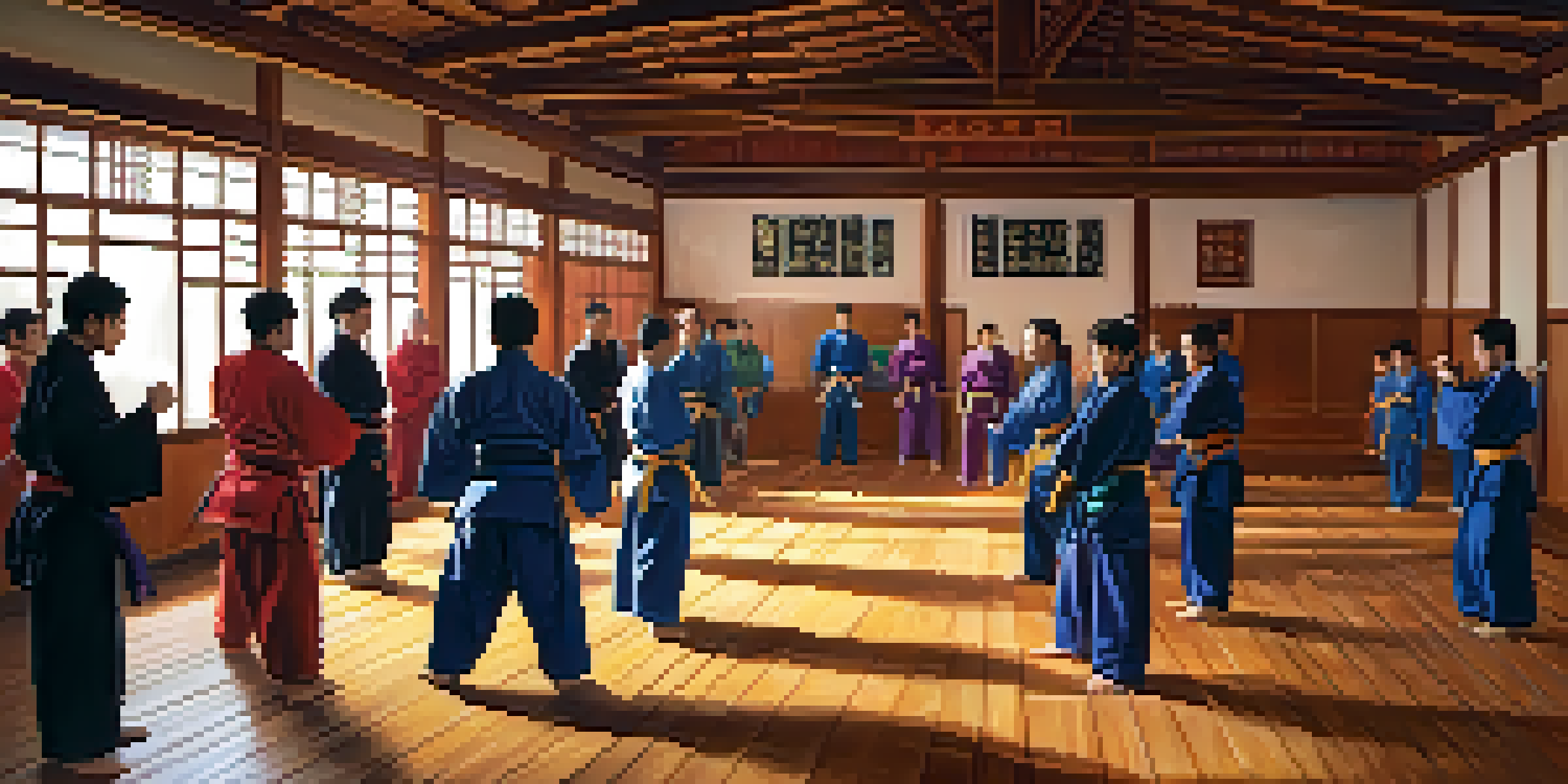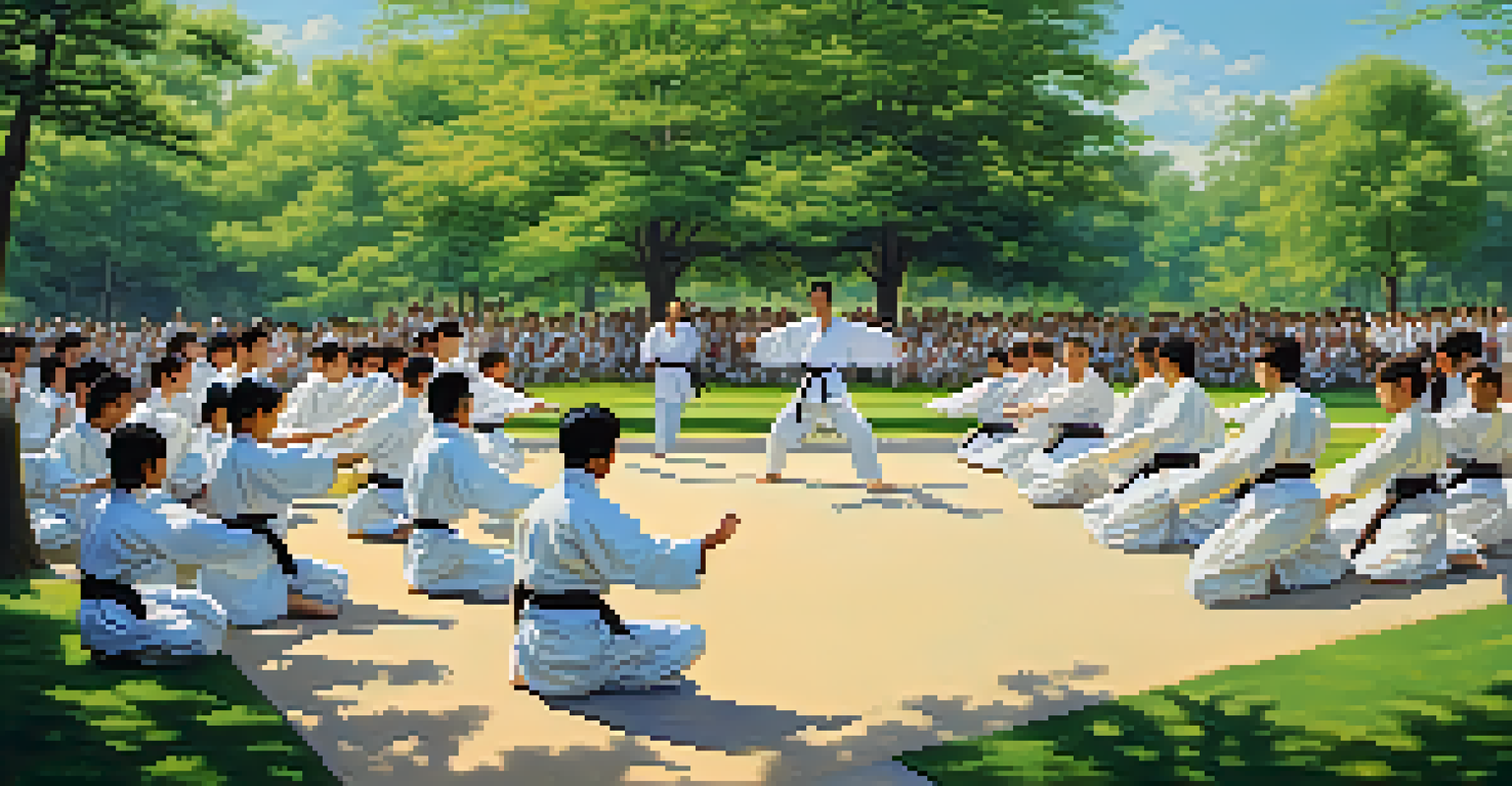Martial Arts as a Bridge Between Cultures and Communities

The Global Roots of Martial Arts
Martial arts trace their origins back centuries, evolving in various cultures. From Chinese Kung Fu to Brazilian Capoeira, each discipline carries unique traditions and philosophies. This global tapestry showcases how different communities have adapted martial practices to fit their cultural narratives.
Martial arts is not about fighting; it's about building a community and respecting one another.
As these arts spread across borders, they often blend with local customs, creating hybrid forms. For instance, Judo, developed in Japan, has found its way into schools and dojos worldwide, resonating with diverse populations. This fusion not only preserves cultural heritage but also invites participation from those outside the traditional frameworks.
The shared language of martial arts transcends verbal communication, making it accessible to people regardless of their backgrounds. Practitioners can connect through shared experiences, fostering an appreciation for each other's cultures while learning valuable self-defense skills.
Building Community Through Training
Martial arts schools often serve as community hubs where individuals come together. Whether it’s a small dojo or a large martial arts academy, these spaces encourage camaraderie and collaboration. Participants of all ages join forces, creating a sense of belonging that extends beyond the training mat.

Through training sessions, members learn not only techniques but also essential life skills like discipline, respect, and teamwork. The bonds formed during rigorous practice can lead to lifelong friendships, bridging gaps between different cultural and social backgrounds. This shared journey of growth fosters mutual respect and understanding.
Martial Arts as Cultural Connectors
Martial arts foster cultural exchange by blending different traditions and promoting understanding among diverse communities.
Moreover, community events such as tournaments or exhibitions showcase diverse martial arts styles, inviting spectators from various walks of life. These gatherings allow people to celebrate their differences and similarities, strengthening the community fabric while promoting inclusivity.
Cultural Exchange Through Martial Arts
Participating in martial arts often opens doors to cultural exchange. Students may learn not only physical techniques but also the history and philosophy behind each style. This education cultivates a deeper appreciation for the cultures from which these arts originate.
The greatest victory is that which requires no battle.
For example, practitioners of Taekwondo often immerse themselves in Korean culture, learning about its language, customs, and traditions. This holistic approach enriches their understanding and fosters a sense of global citizenship among students. It’s a beautiful reminder that martial arts are not merely physical activities but also gateways to cultural exploration.
Workshops and seminars led by masters from different backgrounds further enhance this exchange. They provide opportunities for students to learn directly from those who have dedicated their lives to their craft, breaking down barriers and fostering a spirit of unity.
Empowerment and Confidence Building
Martial arts empower individuals by instilling confidence and self-esteem. As students progress through their training, they learn to trust their abilities, which can translate into other areas of their lives. This newfound confidence often encourages them to take on challenges they might have previously avoided.
In many cultures, martial arts serve as a tool for personal development, especially for marginalized groups. Women, for example, often find strength and empowerment through self-defense classes, allowing them to reclaim their safety and assert their independence. This transformative experience fosters resilience and mutual support among practitioners.
Community Building Through Training
Training in martial arts creates a sense of belonging and camaraderie, bridging gaps between people of various backgrounds.
Furthermore, the journey toward achieving higher belt ranks symbolizes personal growth. Each milestone reached is a testament to their hard work and dedication, promoting a sense of accomplishment that resonates across cultures and communities.
Martial Arts in Conflict Resolution
Martial arts often teach conflict resolution techniques that extend beyond physical confrontations. Many disciplines emphasize the importance of mental discipline and emotional control, which can be invaluable in de-escalating conflicts. This approach promotes peaceful resolutions, fostering understanding rather than aggression.
In communities facing challenges, martial arts can serve as a non-violent outlet for stress and frustration. Practicing together encourages dialogue and collective problem-solving, helping to heal rifts between different groups. This peaceful approach to conflict resolution demonstrates martial arts' potential as a tool for social change.
By emphasizing respect and harmony, martial arts practitioners learn to navigate interpersonal conflicts with grace and understanding. This mindset can ripple through communities, fostering a culture of peace and cooperation.
Inclusivity and Diversity in Martial Arts
Martial arts inherently promote inclusivity, welcoming individuals from all walks of life. Whether young or old, experienced or novice, everyone has a place on the training floor. This openness encourages diverse participation, enriching the martial arts community with varied perspectives and backgrounds.
Many martial arts schools actively work to create inclusive environments, offering scholarships or programs for underrepresented groups. These initiatives help break down economic barriers, ensuring that anyone interested can access training. This commitment to diversity strengthens community ties and fosters a culture of acceptance.
Empowerment Through Self-Defense
Martial arts empower individuals, particularly marginalized groups, by building confidence and self-esteem through personal development.
As martial arts continue to grow globally, efforts to celebrate diversity in training are becoming more common. Events showcasing different styles and cultures highlight the beauty of diversity while promoting understanding and appreciation among participants.
The Future of Martial Arts as a Cultural Bridge
As the world continues to grow more interconnected, martial arts will likely play an even greater role in bridging cultures. With the rise of digital platforms, practitioners can now connect across continents, sharing knowledge and techniques through online classes and virtual competitions. This evolution promotes a global community united by a passion for martial arts.
Moreover, as cultural exchange becomes increasingly important, martial arts can serve as a foundation for deeper understanding and collaboration. By fostering open dialogue and shared experiences, martial arts can help combat stereotypes and misconceptions, paving the way for a more harmonious world.

Ultimately, the future of martial arts rests in its ability to adapt and embrace diversity. As practitioners continue to share their stories and experiences, martial arts will remain a vibrant bridge, linking cultures and communities through the shared pursuit of self-improvement and understanding.